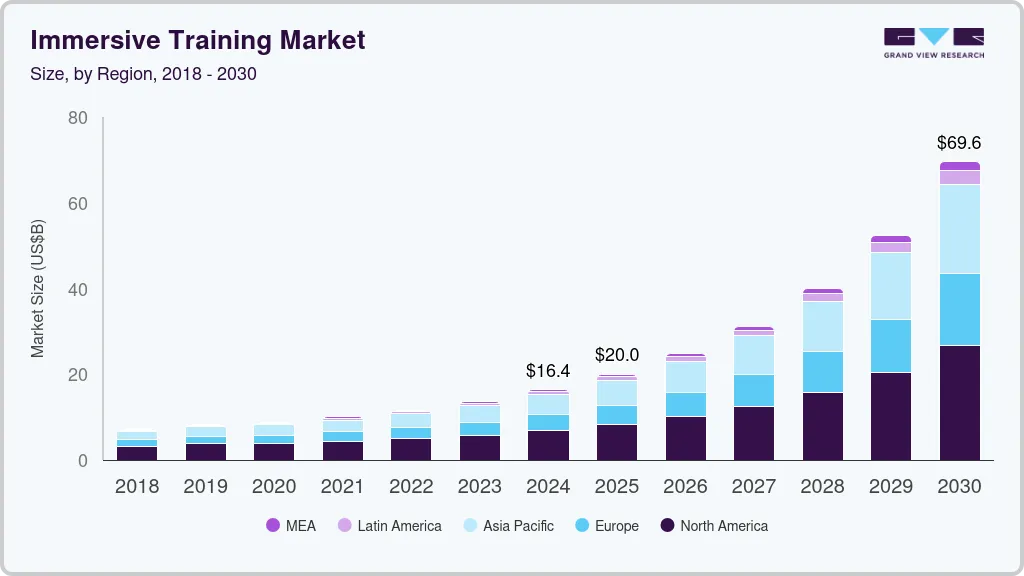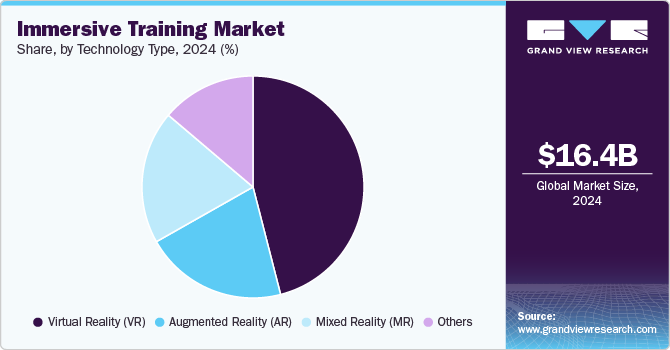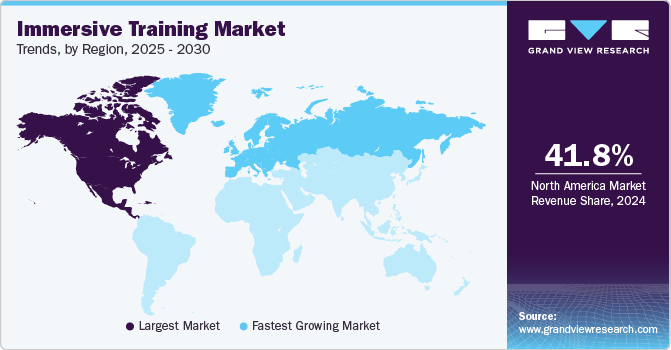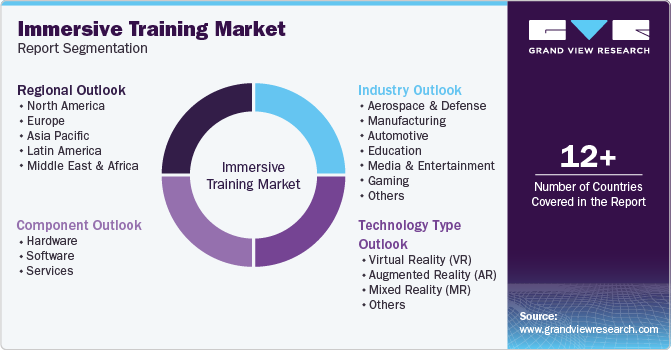- Home
- »
- Next Generation Technologies
- »
-
Immersive Training Market Size, Share, Industry Report 2030GVR Report cover
![Immersive Training Market Size, Share & Trends Report]()
Immersive Training Market (2025 - 2030) Size, Share & Trends Analysis Report By Component (Hardware, Software, Services), By Technology Type (Virtual Reality, Augmented Reality, Mixed Reality), By Industry, By Region, And Segment Forecasts
- Report ID: GVR-4-68040-511-5
- Number of Report Pages: 150
- Format: PDF
- Historical Range: 2018 - 2023
- Forecast Period: 2025 - 2030
- Industry: Technology
- Report Summary
- Table of Contents
- Segmentation
- Methodology
- Download FREE Sample
-
Download Sample Report
Immersive Training Market Summary
The global immersive training market size was estimated at USD 16,401.8 million in 2024 and is projected to reach USD 69,590.5 million by 2030, growing at a CAGR of 28.3% from 2025 to 2030. The market is primarily driven by the significant advancements in Virtual Reality (VR) & Augmented Reality (AR) technologies.
Key Market Trends & Insights
- North America dominated the immersive training market with the largest revenue share of 41.8% in 2024.
- The immersive training market in the U.S. is expected to grow at the fastest CAGR of 25% from 2025 to 2030.
- By component, the hardware segment led the market with the largest revenue share of 48.2% in 2024.
- Based on technology type, the virtual reality (VR) segment led the market with the largest revenue share of 46.0% in 2024
Market Size & Forecast
- 2024 Market Size: USD 16,401.8 Million
- 2030 Projected Market Size: USD 69,590.5 Million
- CAGR (2025-2030): 28.3%
- North America: Largest market in 2024
The growing innovations in hardware, such as more powerful headsets and motion-tracking devices, combined with sophisticated software solutions, are creating highly interactive and engaging training environments. These advancements enable trainees to immerse themselves in realistic simulations, enhancing their learning experiences and improving skill retention, which is expected to further fuel the immersive training industry in the coming years.

The rising demand for enhanced learning experiences across various industries is further driving the immersive training industry. Traditional training methods frequently lack hands-on practice essential for mastering complex skills. In critical sectors such as healthcare, aviation, and manufacturing, immersive training solutions enable professionals to engage in realistic scenarios without the risks associated with real-world applications. For example, medical professionals can practice surgical procedures in a virtual environment, refining their skills before performing on actual patients. This transition towards experiential learning is expected to further fuel the immersive training industry.
Furthermore, the growing investment in research and development is another factor driving the immersive training industry. Both private companies and government organizations are beginning to recognize the transformative potential of immersive technologies in reshaping education and workforce training. Substantial funding is being allocated to develop innovative solutions tailored to specific industry needs, such as safety training in hazardous environments and customer service simulations in retail.This surge in investment accelerates technological advancements and fosters collaboration between educational institutions and industry leaders, cultivating a culture of innovation that benefits all stakeholders involved, and thereby propelling the immersive industry expansion.
Moreover, the increasing popularity of video games inspired by immersive training is emerging as a significant trend within the immersive training industry, creating new revenue streams and expanding audience engagement. These games often feature beloved characters and storylines from popular immersive training series, allowing fans to immerse themselves in familiar worlds while interacting with their favorite characters in dynamic ways. This convergence of immersive training and gaming is enhancing the overall experience for fans and thereby attracting more groups of audience, including gamers who may not have previously engaged with immersive training. These factors are expected to drive immersive industry growth in the coming years.
Component Insights
The hardware segment led the market with the largest revenue share of 48.2% in 2024. This dominance is largely attributed to the increasing demand for advanced devices such as virtual reality (VR) headsets and augmented reality (AR) glasses. As organizations across various sectors, including gaming, healthcare, and education, continue to invest in immersive technologies, the need for high-quality hardware that can deliver realistic and engaging experiences has surged. The proliferation of powerful graphics processing units (GPUs), high-resolution displays, and sensors has further fueled this growth, as these components are essential for creating immersive environments.
The software segment is expected to witness at the fastest CAGR of 29% from 2025 to 2030, driven by the growing need for innovative applications that leverage immersive technologies. As industries increasingly recognize the potential of VR and AR for training, simulation, and interactive experiences, there is a rising demand for software solutions that can create and manage these immersive environments. The emergence of new platforms and tools designed for content creation, as well as advancements in artificial intelligence and machine learning, are enhancing the capabilities of immersive software. This trend is particularly evident in sectors like healthcare and education, where tailored software applications are being developed to improve learning outcomes and operational efficiency.
Technology Type Insights
Based on technology type, the virtual reality (VR) segment led the market with the largest revenue share of 46.0% in 2024, driven by its widespread adoption across various industries, particularly education and corporate training. VR technologies provide highly engaging and interactive experiences that enhance learning outcomes, allowing users to practice skills in realistic simulations. The effectiveness of VR in improving retention and engagement has led to significant investments in VR content creation and hardware, making it a preferred choice for organizations seeking innovative training solutions.

The mixed reality (MR) segment is expected to register at the fastest CAGR from 2025 to 2030, as it combines the best features of both virtual and augmented reality. MR allows users to interact with both digital content and the real world, creating versatile applications that enhance training experiences across various sectors, including healthcare, manufacturing, and education. The growing demand for immersive training solutions that facilitate collaboration, and real-time feedback is propelling the adoption of MR technologies.
Industry Insights
Based on industry, the gaming segment accounted for the largest market share in 2024, driven by the transformative impact of immersive technologies such as virtual reality (VR) and augmented reality (AR). The gaming industry has leveraged these technologies to create realistic and interactive environments that enhance user engagement and experience. The popularity of flagship VR titles, coupled with advancements in standalone VR headsets, has made immersive gaming more accessible to a wider audience, contributing to its dominance in the market.
The healthcare segment is expected to register at the fastest CAGR from 2025 to 2030, fueled by the increasing adoption of immersive technologies for training and patient care. The integration of VR and AR in healthcare is revolutionizing medical education and training by providing realistic simulations that enhance learning outcomes and reduce errors. These technologies enable healthcare professionals to practice complex procedures in a safe environment, improving their skills and confidence before real-life applications. In addition, immersive training solutions are being utilized for patient education and rehabilitation, further driving its demand.
Regional Insights
North America dominated the immersive training market with the largest revenue share of 41.8% in 2024.Companiesare increasingly recognizing the potential of immersive technologies to enhance training, marketing, and customer engagement. The rise of social VR platforms and the concept of the Metaverse are creating new opportunities for virtual interactions and collaborative environments, further fueling investments in immersive training solutions. Sectors such as healthcare, defense, and manufacturing are particularly benefiting from these innovations, as they provide safe environments for professionals to practice critical skills.

U.S. Immersive Training Market Trends
The immersive training market in the U.S. is expected to grow at the fastest CAGR of 25% from 2025 to 2030, driven primarily by the increasing demand for interactive and engaging learning experiences. In addition, industries such as healthcare, aviation, and emergency services in the U.S. are increasingly adopting immersive technologies to provide hands-on training in safe environments, thereby driving market growth.
Europe Immersive Training Market Trends
The immersive training market in Europe is expected to grow at a significant CAGR of 29.7% from 2025 to 2030. In Europe, the immersive training industry is being propelled by a strong emphasis on innovation and the integration of advanced technologies in education and workforce development. Countries across the region are investing in immersive solutions to enhance learning outcomes and improve skills training across various industries. The healthcare sector is leveraging virtual and augmented reality for medical training, while industries like automotive and aerospace are using immersive technologies for design simulations and operational training. In addition, European governments are supporting initiatives that promote digital transformation in education, further driving the adoption of immersive training methodologies.
The UK immersive training market is expected to grow at a significant CAGR during the forecast period. This expansion is largely fueled by advancements in technology and a strong focus on enhancing educational outcomes. The UK government and private sector are investing in immersive technologies to improve workforce training and skill development. In addition, the integration of virtual reality into educational curricula is transforming traditional teaching methods, fostering a culture of continuous improvement and adaptability among learners is driving the market growth.
The immersive training market in Germany is characterized by its commitment to innovation and technological progress, particularly in the engineering and manufacturing sectors. The country's strong vocational training system aligns well with the capabilities offered by immersive technologies, which facilitate practical learning experiences. Companies are increasingly utilizing these solutions to enhance employee skills while ensuring safety in complex operational environments.
Asia-Pacific Immersive Training Market Trends
The immersive training market in Asia-Pacific is expected to grow at a significant CAGR of 29.6% from 2025 to 2030, driven by several factors, including the increasing consumption of digital content and the popularity of streaming services. Countries of the region are leading this trend, with a strong fanbase that actively engages with both local and international immersive training productions. The rise of mobile gaming and interactive content related to immersive training is also a significant trend, enhancing viewer engagement and expanding market opportunities.
The Japan immersive training market is gaining traction owing to the country's emphasis on integrating technology into education and workforce development. There is a rising demand for innovative training solutions across sectors such as healthcare, automotive, and robotics. Japanese companies are adopting virtual and augmented reality technologies to create realistic training environments that enhance skill acquisition without real-world risks.
The immersive training market in China is rapidly expanding owing to the significant investments in technology aimed at improving educational practices. The government actively promotes the use of virtual reality and augmented reality in schools and vocational training programs to enhance learning outcomes.
Key Immersive Training Company Insights
Some of the key players operating in the immersive training industry are Axon Park and Immerse, Inc., among others.
-
Axon Park specializes in immersive training solutions, particularly in the healthcare sector. The company gained recognition for its VR PPE Training Program, designed to train healthcare professionals in the donning and doffing of personal protective equipment (PPE) using a three-cycle training modality. This program utilizes virtual reality to embed critical procedures into learners' muscle memory, enhancing their preparedness for real-world scenarios, especially during the COVID-19 pandemic.
-
Immerse, Inc. is a global provider of immersive learning solutions, focusing on language education through virtual environments. The company offers a platform that allows learners to engage in interactive classes with real-time support from expert Language Guides, facilitating significant progress in language skills. Immerse's approach emphasizes community engagement and personalized learning experiences, making it a valuable resource for educational institutions looking to enhance their language programs.
Atomic Flare and Eleven Arts are some of the emerging participants in the immersive training industry.
-
Inspirit AI, Inc. is dedicated to revolutionizing STEM education through immersive technology. The company provides free 3D learning resources and virtual reality experiences that make science and math more engaging for students. By offering an interactive platform that supports both individual and group activities, the company empowers educators to create dynamic lessons that enhance student understanding and retention of complex concepts. With a focus on accessibility and innovation, Inspirit AI is positioning itself as a key player in the educational technology landscape.
-
Talespin Reality Labs, Inc. is at the forefront of immersive learning and skill development using virtual reality and augmented reality technologies. The company's platform provides organizations with tools to create realistic training scenarios that enhance employee skills across various industries. The company focuses on developing content that helps individuals validate their skills and advance their careers by providing engaging learning experiences tailored to specific industry needs. With its commitment to innovation and collaboration, the company is shaping the future of immersive training solutions in the workforce development space.
Key Immersive Training Companies:
The following are the leading companies in the immersive training market. These companies collectively hold the largest market share and dictate industry trends.
- Axon Park
- Immerse Inc.
- Inspirit AI, Inc.
- Talespin Reality Labs, Inc.
- Ascent XR LLC
- G-Cube
- HoloPundits, Inc.
- Crane Company
- Labster, Inc.
- Mursion, Inc.
Recent Developments
-
In October 2024, Axon's virtual reality (VR) training curriculum received national certification from the International Association of Directors of Law Enforcement Standards and Training (IADLEST). This certification recognizes the curriculum's alignment with national standards for law enforcement training, enhancing its credibility and effectiveness.
-
In October 2024, Cornerstone On Demand Inc. unveiled Immerse Companion, a new generative AI solution designed to enhance workforce training by providing real-time interactions with virtual human companions. Announced at UNLEASH World, this innovative platform allows employees to engage in role-play, coaching, and skill-building sessions on demand, transforming traditional talent development into an interactive experience.
-
In August 2024, Mursion, Inc. announced its acquisition of Valor Performance, enhancing its workforce upskilling platform by integrating personalized leadership coaching with AI-powered practice simulations. This strategic move aims to create a comprehensive skills-building solution that delivers measurable improvements in individual, team, and organizational performance.
Immersive Training Market Report Scope
Report Attribute
Details
Market size value in 2025
USD 19,998.2 million
Revenue forecast in 2030
USD 69,590.5 million
Growth rate
CAGR of 28.3% from 2025 to 2030
Base year for estimation
2024
Historical data
2018 - 2023
Forecast period
2025 - 2030
Quantitative units
Revenue in USD million/billion and CAGR from 2025 to 2030
Report Product
Revenue forecast, company ranking, competitive landscape, growth factors, and trends
Segments covered
Component, technology type, industry, region
Country scope
U.S.; Canada; Mexico; UK; Germany; France; China; Australia; Japan; India; South Korea; Brazil; South Africa; Saudi Arabia; UAE
Key companies profiled
Axon Park; Immerse Inc.; Inspirit AI, Inc.; Talespin Reality Labs, Inc.; Ascent XR LLC; G-Cube; HoloPundits, Inc.; Crane Company; Labster, Inc.; Mursion, Inc.
Customization scope
Free report customization (equivalent to up to 8 analyst’s working days) with purchase. Addition or alteration to country, regional & segment scope.
Pricing and purchase options
Avail customized purchase options to meet your exact research needs. Explore purchase options
Global Immersive Training Market Report Segmentation
This report forecasts revenue growth at global, regional, and country levels and provides an analysis of the latest technological trends in each of the sub-segments from 2018 to 2030. For this study, Grand View Research has segmented the global immersive training market report based on component, technology type, industry, and region:

-
Component Outlook (Revenue, USD Million, 2018 - 2030)
-
Hardware
-
Software
-
Services
-
-
Technology Type Outlook (Revenue, USD Million, 2018 - 2030)
-
Virtual Reality (VR)
-
Augmented Reality (AR)
-
Mixed Reality (MR)
-
Others
-
-
Industry Outlook (Revenue, USD Million, 2018 - 2030)
-
Aerospace & Defense
-
Manufacturing
-
Automotive
-
Education
-
Media & Entertainment
-
Gaming
-
Healthcare
-
Retail & E-commerce
-
Others
-
-
Regional Outlook (Revenue, USD Million, 2018 - 2030)
-
North America
-
U.S.
-
Canada
-
Mexico
-
-
Europe
-
UK
-
Germany
-
France
-
-
Asia Pacific
-
China
-
Japan
-
India
-
South Korea
-
Australia
-
-
Latin America
-
Brazil
-
Mexico
-
-
Middle East & Africa
-
Saudi Arabia
-
South Africa
-
UAE
-
-
Frequently Asked Questions About This Report
b. The global immersive training market size was valued at USD 16,401.8 million in 2024 and is expected to reach USD 19,998.2 million by 2025.
b. The global immersive training market is expected to grow at a compound annual growth rate of 28.3% from 2025 to 2030 to reach USD 69,590.5 million by 2030
b. The hardware segment dominated the market in 2024 of over 48%, driven by the increasing demand for advanced devices such as virtual reality (VR) headsets and augmented reality (AR) glasses.
b. Some key players operating in the immersive training market include TAxon Park, Immerse Inc., Inspirit AI, Inc., Talespin Reality Labs, Inc., Ascent XR LLC, G-Cube, and HoloPundits, Inc
b. The growing innovations in hardware, such as more powerful headsets and motion-tracking devices, combined with sophisticated software solutions, are creating highly interactive and engaging training environments, thereby driving market growth.
Share this report with your colleague or friend.
Need a Tailored Report?
Customize this report to your needs — add regions, segments, or data points, with 20% free customization.

ISO 9001:2015 & 27001:2022 Certified
We are GDPR and CCPA compliant! Your transaction & personal information is safe and secure. For more details, please read our privacy policy.
Trusted market insights - try a free sample
See how our reports are structured and why industry leaders rely on Grand View Research. Get a free sample or ask us to tailor this report to your needs.










